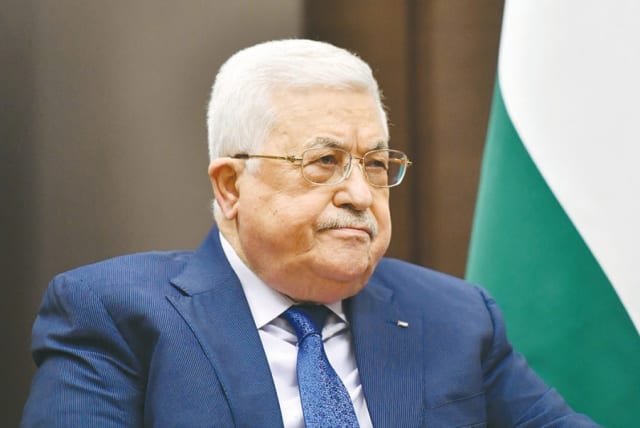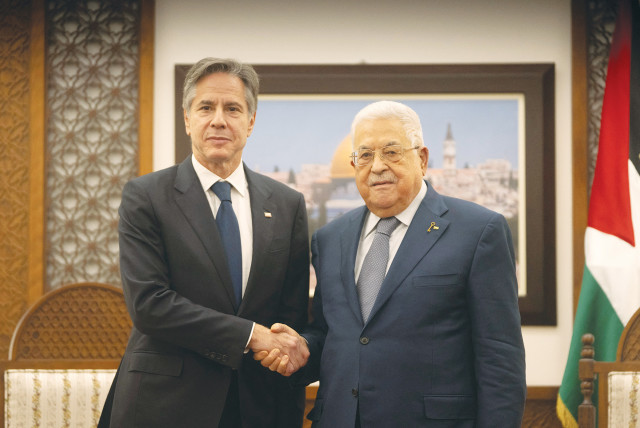As Palestinian Authority’s fiscal struggle deepens, citizens feel the pain - analysis

The financial crisis faced by PA public servants is has reached a critical point. Since August 2022, they haven't received full salaries, leaving them uncertain and unprepared for what lies ahead.
[Ramallah] Restlessly, Mohammad stood at the cashier’s desk in one of Ramallah’s supermarkets. He was the third in a line of about seven people who had just filled their shopping carts and were waiting to pay their bills. The first man had just finished, and the second in the line had half his cart full of items. The cashier scanned the price tags via the barcode reader. The customer closely monitored the bill sum and, at one point, looked down at the cashier and said: “Stop, please. I need to take some items back to their shelves. The counter shows that I reached the 500-shekel limit that I can use.” The cashier, a nice-looking woman in her late 20s, was embarrassed. She was alone. Her colleague had left for the morning half-hour break.
Like Mohammad, other customers were now watching with growing impatience. The tension in the line was thick, almost tangible. One spoke to the customer over Mohammad’s shoulder and said, “You should have thought of this before you threw all those items in the cart. Others were too embarrassed to criticize the customer. One said, “Every person has certain financial constraints, and others are only supposed to respect, not condemn them.” A third guy said, “Israel first and the PA second must be blamed for the overall financial crisis in Palestine, which has been exacerbated since the Gaza war started almost eight months ago.”
The customer turned around, looked at those behind him, and said, “I don’t blame you. Had any of you been part of the PA public sector, he would have immediately understood our complex situation. Just give me one example of someone whose full salary is barely enough to bring bread to his family and then goes into a process in which his monthly wages dropped gradually to 80%, then 70, 60, and now 50%.”
Mohammad was caught in this verbal crossfire and indulged in the discussion. “I work for a leading private company here, and we, too, face the consequences of the dire financial crisis,” he said. He noted that his salary had been paid regularly in full until lately, when his boss said the company would soon follow austerity protocols because it couldn’t hold its contracts with PA government bodies due to overdue payments.
'The worst ever faced' since 1994
The current PA financial crisis is believed to be the worst ever faced since the 1994 founding of the Palestinian Authority. It peaked with the government’s inability to pay total salaries to public sector employees. The sharp decline resulted from the gradual erosion of the PA’s five budget pillars: (1) clearance of taxes collected by Israel and transferred monthly to the PA treasury; (2) EU financial support; (3) loans and grants from the World Bank; (4) US support; and (5) support from Arab countries (Algeria until now and Saudi Arabia until April 2020.)
The Palestinians have always complained of not having an independent or semi-independent economy as their economy has been bonded with that of Israel since the first day of the Israeli occupation that started after the June 1967 war. Even when the PA was founded, the Palestinian economy remained glued to Israel by de facto measures and then by the Paris Economic Protocol of 1995.
Moayad Afaneh, a Palestinian economist, wrote in a local newspaper that the Israeli occupation “is to blame for creating the permanent crisis for the Palestinians because it has deprived them of their resources, such as land, water, control over crossings, cross-border trade and movement of people and, last but not least, the withholding of tax revenues by Israel.”
Afaneh described the PA financial crisis as a structural one that cannot be resolved by temporary measures that have proven ineffective. “It is a nonstop bleeding in the Palestinian budget, affecting net lending, medical transfers, salaries, electricity and water prices, and the continued purchase of health and medical services from the private sector or abroad.” However, the PA has recently enforced strict rules on transferring patients for medical treatment to Israel, Jordan, or Egypt. Only severe cases are transferred with stringent rules that allow only one family member to escort the patient and seek the best cost-effective accommodation in the host country.
The EU, the World Bank, and other international donors argue that their funding to the PA has declined over several reservations and issues, including incitement against Israel in school textbooks. Officially and publicly, the Palestinians are sure the incitement accusations came repeatedly from the Netanyahu government over the past 12 years, while no impartial party could validate them. Other Palestinians argue that the amount of incitement in Israeli textbooks and curriculum is much worse than what is attributed to Palestine.
Khalil, a high school history teacher from Nablus, said every reference to the contemporary history of the conflict “is carefully worded so we won’t be blamed.” However, he said, “Israeli students learn how their ancestors came to our land, described as a land without a people for a people without a land.” A friend sitting on the side and listening to the chat stepped in and argued that both sides were right, yet both were wrong, too. He argued that denying the other is never healthy for either side. “The best both Palestinians and Israelis can do is rid themselves of past griefs and grievances, look for a better future, and seek a good neighborly relationship in two states, Israel and Palestine, side by side along the June 1967 lines,” he said.
He admitted that he feels too worried or sometimes afraid of teaching history when he cannot refer to what happened in the region in the past century or more. He said his students ask numerous questions about things not included in the textbooks. He sometimes reluctantly avoids answering some problematic questions. His concern stems from the likelihood of “being picked up one day by the Israeli soldiers and charged with inciting students to attack Israelis only because I dare tell them what the armed Jewish groups did before and after Israel’s proclamation in 1948.”
Khalil doesn’t hide his concern about being arrested. A father of five, he feels like a barefooted person jumping on burning charcoal. “Every step is dangerous. Every step is painful. I cannot think of what may happen to my family if I am fired from my job or, worse, get arrested by the Israelis,” he said.
Another point of contention between the PA and Israel is the monthly stipends paid to families of Palestinians killed in clashes with the Israeli army or convicted of carrying out an array of resistance activities and subsequently sent to jail behind Israeli bars. The argument one would hear from most Palestinians on this issue is somewhat identical. They almost unanimously support, and some admire, what Palestinians incarcerated in Israel did in defending Palestinian rights. I was perplexed to answer a question one threw right into my face: “Why are we condemned as terrorists, and the Israelis are blessed for supporting their army in doing what it does against us? Aren’t both recruited to defend their side?”
Ali is the father of three Palestinian brothers serving long-term sentences in Israel. He insisted his three sons were entitled to PA monthly salaries. Had the PA refrained from paying them their dues, he said he would have launched a public campaign condemning every PA government official. “How come Israel is punishing the PA for paying salaries to my family on the grounds of resistance to the occupation and yet allows the Qataris to send $30 million in cash every month to Hamas in Gaza, although Hamas continued firing rockets at Israel? Isn’t that hypocrisy in its most blatant form?”
The move started in 2018 when the Knesset passed a law that obliged the Israeli government to deduct the amounts paid by the PA to families of Palestinians killed or imprisoned by Israel. The irony in the whole story was in the fact that the US, the main guarantor of the Oslo Accord, and Israel never said a word about those prisoners and the money they were paid. They ignored all the payments made by the PA between 1994 and 2018. Palestinian officials argue that the Israeli decision was purely political and had nothing to do with any legal or other reasons. According to them, Israel has tried on numerous occasions to blackmail the PA into ceasing its payments to those families. President Mahmoud Abbas repeatedly responded to those attempts, saying, “We won’t forget our sons, and we will continue to pay their dues even if only one dollar is left in our pocket.”
All Palestinian prisoners jailed before the signing of the Oslo Accords in September 1993 were destined for release by Israel before the end of the five-year interim phase of the agreement. Israel undertook to release them, but it didn’t. From a Palestinian perspective, the public owes a lot to those prisoners who gave the best years of their lives for the sake of their national cause. “This is natural,” said Yousef, a Palestinian whom Israel arrested in 2003 during the Second Intifada and sentenced to 20 years imprisonment for shooting at Israeli troops, injuring three soldiers. “Why am I supposed to spend all those years neglected by my people or leadership while nations worldwide respect their soldiers who defend their countries just as we do?” It was a question of logic that juxtaposed the complex differentiation between right and wrong or between terrorist and freedom fighter.
Jerusalem Post Store
`; document.getElementById("linkPremium").innerHTML = cont; var divWithLink = document.getElementById("premium-link"); if (divWithLink !== null && divWithLink !== 'undefined') { divWithLink.style.border = "solid 1px #cb0f3e"; divWithLink.style.textAlign = "center"; divWithLink.style.marginBottom = "15px"; divWithLink.style.marginTop = "15px"; divWithLink.style.width = "100%"; divWithLink.style.backgroundColor = "#122952"; divWithLink.style.color = "#ffffff"; divWithLink.style.lineHeight = "1.5"; } } (function (v, i) { });

